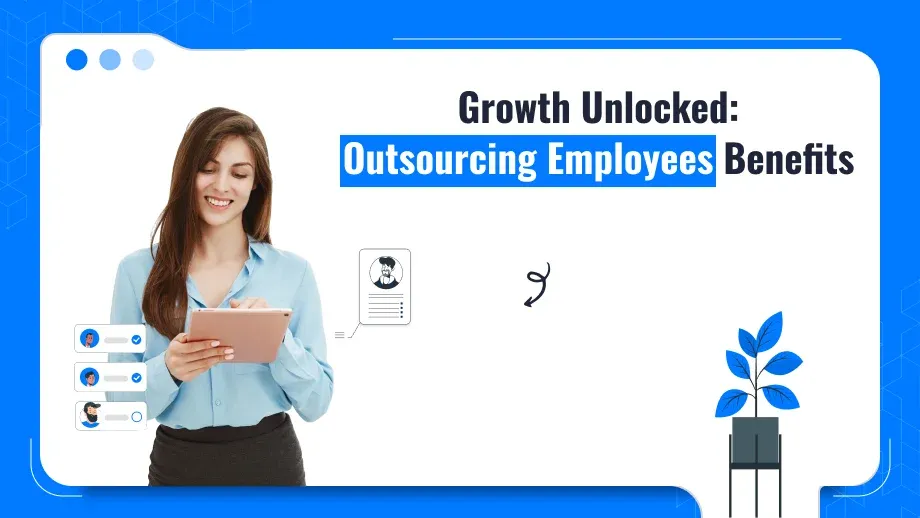
In today’s fast business world, opportunities are always sought to increase efficiency and save costs. If there is a perfect way to do this, it could be through outsourcing employees. This is the contracting of external service providers to engage in specific functions or tasks so that you can focus more on what you do best while they use their expertise. This article explains the benefits of outsourcing employees to the organization, the challenges you may face, and best practices for getting it right.
What is Outsourcing Employees?
It is a classification that involves employees from hiring external companies or persons brought into any organization to perform work that can be done internally. In this, many forms of outsourcing will include operational, functional, and project-based ones. Their aim is to make the operations much smoother, service delivery more efficient, and lower maintenance costs of full-time workers.
Types of Outsourcing:
- Operational Outsourcing: It is called operational outsourcing, and this refers to the relocation of routine, day-to-day activities such as customer service or IT support outside to an external vendor. The companies then focus on the core business while ensuring that basic services are performed.
- Functional Outsourcing: This model outsources complete functions such as HR Outsourcing Statistics or finance to specialized companies. Companies will then enjoy the expertise and technology offered by these providers without having them in-house.
- Project-Based Outsourcing: Companies may also outsource particular projects if there is a need for those specialized skills. This will enable companies to utilize outsider expertise they require for short-term needs without having to commit full-time for the long haul.
Outsourced Functions: Companies outsource employees for the following functions among others:
- IT Support: Managing technology infrastructure and user support is a common outsourced service. This means internal teams can focus on core activities while external experts handle IT issues.
- Customer Service: Many companies outsource customer service functions to be more responsive and efficient. By using dedicated call centers or online support teams companies can improve customer satisfaction.
- Payroll Management: Outsourcing payroll processing removes the complexity of handling employee compensation and taxes. This allows companies to become compliant and avoid administrative burdens.
Benefits of Outsourcing Employees
Cost Efficiency
One of the most common reasons companies hire outsource worker is for cost-cutting. By outsourcing their services, a firm can effectively reduce drastically the number of employee salaries, benefits, and overheads. This is very good for small and medium-sized enterprises since they lack the resources to sustain an enormous in-house workforce.
For example, outsourcing the salaries of employees can provide access to competitive labor markets without the burden of those high wages and benefits that accompany full-time employees. Companies can share the costs of outsourcing while owning access to skilled talent when partnering with an outsourcing service.
In addition, outsourcing HR allows companies to transform fixed costs into variable costs so they pay only for the services they need when they need them. This flexibility can improve cash flow management.
Access to Specialized Skills and Advanced Technology
Outsourcing can ensure that organizations gain access to a pool of expertise and advanced technology that they may not have in-house. For example, an alliance with any one of the available technology outsourcing vendors may bring into their organizations some expertise that is currently lacking in software development, cybersecurity, and data analysis without the need for important investment in training and infrastructure.
Using an outsourcing service in this regard enables companies to stay competitive by adopting the latest technology and best practices provided by specialized service providers. This access to advanced tools can improve operational efficiency and service delivery.
Companies are often better placed to adopt new technology by external providers rather than internal teams due to their expertise and the resources available to them. This is an edge over any competitors companies might have.
Emphasis on Core Business Activities
With outsourcing, internal staff resources are freed up to focus on core activities that further promote business growth. For example, a company that is basically product development may outsource its customer service so that more hours of its employees would be spent on innovation and expanding markets.
Core competencies would enable the organization to focus on efficiency and productivity. This would help the whole organization improve as well for some time. It also sends non-core functions or activities to outside experts, so the internal team can focus on strategic initiatives that are relevant to long-term goals.
It might also encourage innovation. The people could spend more time on trying some things with problems and creating new products or services.
Scalability and Adaptability
Flexibility is undoubtedly one of the highest benefits of outsourcing employees salaries It allows companies to scale up or down their workforce according to the needs of any project or changes in market conditions. This is very important in today’s fast-moving world because market demands could shift quickly.
For example, during peak periods, firms can outsource staff who will increase the workforce to handle more workload without necessarily increasing their full-time attendance management software. During lean seasons, they can reduce contracted workforce levels to their appropriate number and manage costs.
This is what helps companies quickly respond to market conditions and customer needs, remain competitive, and be responsive to evolving circumstances.
Challenges of Outsourcing Employees
Though the merits of outsourcing staff are clear, the firm also needs to be adequately conscious of the dilemmas it presents:
Communication and Collaboration Discrepancies
Outsourcing is bound to be a definite communication gap, particularly if teams have been dispersed to different locations or spread across time zones. The trick here is finding the right channels that can ensure outsourced teams are on the same sheet as company objectives and expectations.
It is further required to provide the teams with the necessary collaborative tools and technology to convey and share information in real-time to manage projects more effectively. In a geographically distributed team, regular meetings and updates can help bridge the gap and facilitate teamwork. With HRMS payroll software in India, the above collaboration is augmented by ensuring that all the team members have access to such information and other resources, streamlining the payroll process, and communicating project progress and team contribution transparently.
Quality Assurance Issues
Controlling quality is not an easy issue for companies that outsource most of their work to external vendors. Companies have to enforce more objective standards and metrics for continuous review and measurement of outsourced teams. This is critical to ensure work meets company expectations and standards.
Quality control checks and continuous feedback within companies enable them to find problems during the early stages of production and make necessary adjustments for maintaining quality at a high standard.
Cultural Differences and Integration Issues
When outsourcing employees companies may face cultural differences that can impact collaboration and teamwork. Understanding and valuing these differences enables companies to induct better and collaborate well between in-house staff and outsourced leave policy for employees.
All these can be reduced by providing cultural awareness training and in working to create an atmosphere of inclusivity so all employees find value in their work.
Data Security and Compliance Issues
Sharing information with third-party service providers poses a lot of risks concerning data security and compliance. Companies have to scrutinize their would-be third-party service providers to certify that they are up to par with data protection regulations and have good security systems to guard sensitive information.
Due diligence and data handling protocols protect the company data and compliance.
Best Practices for Outsourcing Employees
When outsourcing employees, companies look to get value out of such outsourcing; however, to achieve this, here are a few best practices that can be put in place:
Definition of Clear Goals and Expectations
The companies must also provide clear goals and expectations of this employment outsourcing initiative. This would include results, measurements, and timelines by which these goals are to be realized. In such a situation, clear communication of expectations ensures that in-house and outsourced teams are on the same page and working towards the same goals.
Selecting the Right Outsourcing Partner
An appropriate provider is the key to a successful outsourcing strategy. Companies must assess their potential partners with criteria such as area of expertise, track record, and cultural aspects. A strong partnership based on trust and collaboration should come first.
Interview, review case studies, and ask for references to assess the capabilities and fit of the potential partners.
Strong Communication Channels
Communication is always fundamental in ensuring the success of outsourcing relationships. Companies should have several check-ins, updates, and feedback mechanisms to keep both their in-house and outsource salary teams in sync and informed.
Collaboration and transparency may be heightened by using project management tools that enable teams to track progress and solve problems early on.
Monitoring Performance and Gathering Feedback
Companies must, therefore, implement KPIs in the outsourcing of employees so that the success of the outsourcing arrangement can be accessed. Their working targets would be achieved with periodic reviews and feedback sessions that enable one to appraise areas outsourcing of work that require improvement. Using HRMS software in india India can make this process smooth; it is effective in tracking and reporting KPIs that aid in the outcome of a specific operation and subsequently better results on outsourced teams.
Through continuous improvement, companies can change their outsourcing strategy based on growing needs and expectations.
Investing in Training and Development
Development and training of outsourced workers improve their skills and performance. Companies can partner with outsourcing partners to provide training facilities representing the objectives and standards of companies.
Spend time and resources on the professional development of outsourced employees. This might lead to higher job satisfaction as well as service delivery.
Summary
It becomes necessary for companies to outsource employees if they want to work more efficiently and with low costs, acquire specialized skills, and so on. If the advantages of the employee outsourcing company are thoroughly considered, it acts as a prerequisite that will help companies focus on their core and tide them over the torrid issues of a competitive world. Effective outsourcing strategies like defining a clear goal, selecting of the right partners, and setting good communication channels will lead companies to enjoy long-term growth and success. HRMS software in India can further help perform this strategy by having streamlined management tools that further improve tracking of performance by outsourced employees and coordination between teams.
In a world where agility and efficiency are key outsourcing employees is a solution for companies that want to thrive in a complex world. By doing so companies can unlock new opportunities and innovation while staying focused on their core.









